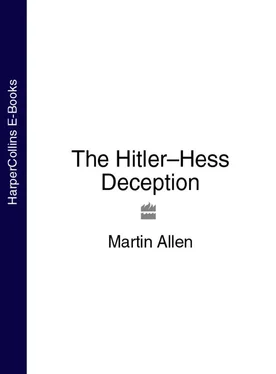By 1919, following a brief wartime career as an artillery general in the service of the Kaiser, Karl Haushofer, now titled Professor General, had become a member of Munich University’s Department of Geography. Here he lectured on his new science of geopolitics, defined as ‘a science concerned with the dependence of the domestic and foreign politics of peoples upon their physical environment’. 12He was already redefining his theories, adjusting them to explain why Germany’s turn-of-the-century imperial and foreign policies had proven unworkable. His theories, which he was to postulate to the eager Rudolf Hess, had evolved in the following way: Imperial Germany’s attempts at empire had been fatally flawed. Her colonies lay far overseas, and thus were not safe so long as Britain ruled the waves. Therefore, Haushofer declared, Germany should recognise that these colonies were of no practical use, and should be given up in exchange for the right to expand Germany’s land-based European frontiers to re-absorb all Europe’s ethnic Germanic peoples in western Poland, the Sudetenland, Austria, the north-western extremity of Yugoslavia, Switzerland, northern Italy and Alsace-Lorraine, together with sufficient territory to meet her new needs ( Lebensraum ). Germany’s future prosperity lay in obtaining a land-based empire of connected territory (safe from the dangers of the sea) to the east, a vast ‘Eurasian Empire’ that might one day stretch from the Baltic to the Pacific. Haushofer quietly ignored the small but significant fact that this territory currently belonged to someone else – Russia.
Whilst Hess was becoming ever more involved with Professor Haushofer, taken in like a long-lost member of his family and enormously enjoying his new role of university student, another force began to enter his life. Late in the spring of 1921, Hess persuaded Professor Haushofer to accompany him one evening to a working-class district of Munich to hear a man – Hess did not know his name – speak.
With some misgivings, Haushofer accompanied Hess to a roughneck beerhouse called the Sterneckerbrau. Once inside, they took a seat at the rear of a dingy, smoke-filled back room, the air heavy with the scent of tobacco, beer and sweat. Soon a man stood up on a low platform at the front and began to talk. Haushofer would later recall how he noticed that once Adolf Hitler’s harsh-toned voice began haranguing his audience, rising in tempo and ferocity against the injustices of the Treaty of Versailles, venting his spleen against the evils of Communism and gesticulating wildly, Hess became mesmerised.
Karl Haushofer was not as immediately impressed with Hitler as Hess was. He thought Hitler’s rantings crude and without form, basically echoing and amplifying the cry of the Nationalists who could be heard on any street corner in Munich, angry men decrying the way Germany had been defeated, denouncing the injustices of 1919, and condemning those villainous Communists who would see their beloved fatherland ruined. However, despite his first impression that Hitler’s style was overly dramatic and noisy, the Professor of Geopolitics did pay attention to the evident way Hitler’s oratory instilled enthusiasm in the crowd by sheer force of will. Here was a man of potential, a man who with guidance and support could become an important force. All he needed was a political education; tutoring in the use of protocol, political finesse and style.
Later that same night Hess persuaded his new girlfriend, Ilse Pröhl, to accompany him to another meeting at the Sterneckerbrau, saying: ‘You must come with me to a meeting of the National Socialist Workers’ Party. I have just been there with the General. Someone unknown spoke … if anyone can free us from Versailles he is the man – this unknown will restore our honour.’ 13
Adolf Hitler in 1921 was a case of a man with extraordinary speaking ability being in the right pace at the right time. What he said was on the whole well received because it was what the people wanted to hear. In 1920s Munich, the masses did not want to hear that Germany had lost the First World War through the ineptitude of its leaders; that the German military’s yearning to flex its muscles had blinded it to the dangers of fighting Russia, France and Britain at the same time, with disastrous results. Hitler charged into the political arena and, with all the venom of a maniacal bible-belt preacher, screamed that Germany had been tricked and deceived, that underhand people had worked behind the scenes to cause the country’s downfall. And worse yet, he proclaimed, those plotters were still at work against Germany and her people. With a powerful turn of phrase and a magnetism rarely seen in politics, Adolf Hitler indoctrinated his audiences with the idea that anti-German plotters, Communists and, worst of all, the Jews, were to blame for all their woes. Germany’s only saviours, he proclaimed, the only men willing to stand up against these evils, were the National Socialists – the Nazi Party.
With Hitler’s arrival on the scene, a new phase of Rudolf Hess’s existence began. Over the next two decades the lives of Hess and Hitler would become inexorably entwined as the Nazi Party struggled to find its feet, fought for the hearts and minds of the German people, strove for success at the ballot box, and ultimately took and held power. The first and most serious hiccup to Hitler’s progression came a mere two years after Hess’s first encounter with his Führer, or the Tribune, as Hess at first called him.
In 1923 Hitler mistakenly concluded that Germany’s fragility as a democratic state led by a weak government made it ripe for a coup d’état , and he believed he could take a short-cut to power by instigating a Putsch. That Hitler, with the backing of only a small nationalist movement, took this enormous step might with hindsight seem to have been total folly. However, Hitler was a great digester of newspapers. He had developed a passion for news, for reading about politics and foreign affairs, and he could see the other strong men of Europe successfully taking power whilst Germany crumbled into economic ruin. Indeed, only the year before the man Hitler most admired, Benito Mussolini, had led his Fascists on Rome where, aged only thirty-nine, he had been placed in power by King Victor Emmanuel III.
At the beginning of 1923 Germany had defaulted on her reparations payments to France, as set down in the Versailles Treaty, and the French had invaded the Ruhr to enforce payment. Instantly Germany’s inflation rocketed out of control – soon a single postage stamp would cost ten thousand marks. Hitler must have thought the time was ripe to do away with the old order, and took the bold step of attempting to usurp power before events took the initiative away from him.
Hitler’s second-in-command for the Putsch was a powerful force within the Nazi Party, former flying ace Hermann Göring, who led the Sturmabteilung (SA) or Storm Troopers. *Hess too had an important role, for whilst he officially led only the student wing of the SA, Hitler by now relied heavily on him, giving him ‘special orders’ to capture key members of Bavaria’s government, who would be attending a political gathering at Munich’s Bürgerbräukeller. Hess would later recall that his meeting with Hitler just prior to the coup attempt had ended with ‘a solemn handclasp … and we parted until evening’. 14
That evening, Thursday, 8 November 1923, saw an extraordinary scene, even by German standards of the 1920s, as a sedate political meeting at the Bürgerbräukeller was interrupted by machine-gun-toting, steel-helmeted SA men, led by a fanatical individual in a long black overcoat – Adolf Hitler.
After bursting in, Hitler leapt up onto a chair, fired his pistol into the air, and as the speaker on the platform subsided into shocked silence, brazenly declared: A ‘national revolution in Munich has just broken out.’ To which he added untruthfully, ‘the whole city is at this moment occupied by our troops. This hall is surrounded by six hundred men.’ 15
Читать дальше












